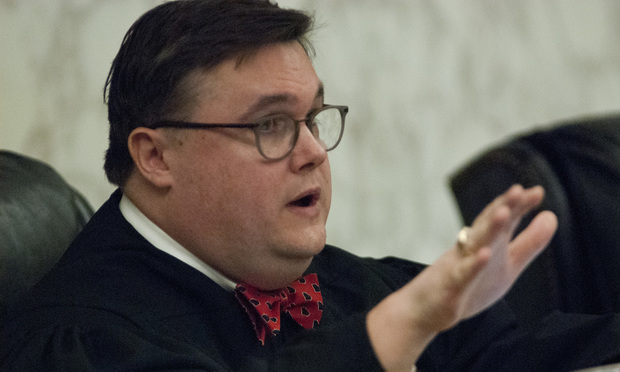Appeals Court Chief Scorches Judge for Barring Home School
“The liberty interest of parents to direct the upbringing, education, and care of their children is the most ancient of the fundamental rights we hold as a people,” Chief Judge Stephen Dillard said, adding it's “deeply embedded in our law.”
October 22, 2018 at 12:17 PM
6 minute read
 Judge Stephen Dillard, Georgia Court of Appeals. (Photo: John Disney/ALM)
Judge Stephen Dillard, Georgia Court of Appeals. (Photo: John Disney/ALM)
Georgia Court of Appeals Chief Judge Stephen Dillard, known for his friendly banter about the Oxford comma and college football with his 14,000 Twitter followers, has taken a trial judge to task for nothing less than what he called usurping the fundamental right of parents to raise their children.
Dillard wrote a 12-page special concurrence for a 10-page decision released Thursday reversing a trial judge who had ordered a mother to stop home schooling her youngest child and commanded the mom to enroll the child in a Montessori school instead.
“The liberty interest of parents to direct the upbringing, education, and care of their children is the most ancient of the fundamental rights we hold as a people,” Dillard said, adding that the concept is “deeply embedded in our law.”
Dillard said this right “preexists government, and may not be interfered with by the State except in the most compelling circumstances.” He said no such compelling circumstances were presented in this case, in which the ruling below was reversed by a panel of three that included Judges Amanda Mercier and Sara Doyle, as well as Dillard. Mercier wrote for the majority.
“I concur fully in the majority's thoughtful and well-reasoned opinion. As a result, it may be cited as binding precedent,” Dillard said in the first of his 24 footnotes, two of which took up nearly an entire page.
“I write separately to express my serious concerns with the court's decision to summarily substitute its judgment regarding the child's education for the mother's without identifying evidence of the compelling circumstances necessary to interfere with her constitutional parental rights,” Dillard said. “In doing so, the trial court failed to give sufficient consideration to the federal and Georgia constitutions, both of which afford significant protection of a parent's right to the care, custody, and control of his or her child—which undoubtedly includes the right to make educational decisions.”
Dillard went so far as to invoke the fictional “Big Brother” in George Orwell's totalitarian tale “1984.”
“When state actors engage in this sort of Orwellian policymaking disguised as judging, is it any wonder that so many citizens feel as if the government does not speak for them or respect the private realm of family life,” Dillard asked rhetorically. “In sum, I take this opportunity, yet again, to remind our trial courts that, in making any decision or taking any action that interferes with a parent-child relationship, our state statutes are subordinate to and must be construed in light of the fundamental rights recognized by the federal and Georgia constitutions—which both include a parent's fundamental right to homeschool a child.”
The appeal that sparked the chief's ire is a long-running divorce and custody battle in Bartow County Superior Court before Judge Suzanne Smith. According to the appeals court, Brian and Stefanie Borgers were divorced in 2013. The mother was awarded custody of their three minor children. In the following years, the judge held several more hearings over child support and visitation issues, during which the father was critical of the mother home-schooling the children. After one such hearing, in June 2017, the judge expressed agreement with the father.
“The Court finds it to be a shame that the Defendant Mother has not taught her children to be independent,” the judge said in an order. She added her opinion was “based on the expert witness testifying that the children have issues in small classes as they have been previously home schooled by the Mother.”
The judge held another status hearing in August 2017, after which she issued the home-school order. Mercier's majority opinion quoted the judge's order citing the “court's own beliefs as to the child's best interest” and ordering the mother to “immediately enroll the child in school and ensure the child is not 'home schooled.' ”
The mother argued on appeal that because the final divorce decree made her the primary physical custodian and final decision-maker regarding the children, which included the authority to make decisions regarding the children's education, the trial court's order constitutes an “improper modification of custody in this contempt action,” Mercier said. Mercier said that the case was not exactly like others in prior rulings, but concluded that “where a child goes to school is a parental decision.”
The mother was represented on appeal by Joel Thornton of the International Human Rights Group in Rome.
“It's a case of first impression. This judge was extremely hostile to home schooling,” Thornton said Friday evening. “My client is thrilled to have her right to choose the educational opportunities of her children upheld.”
The father was represented at the trial court by Samir Patel of White & Choate in Cartersville. Patel said by email Friday that the father chose not to fight the appeal because “it would continue the difficulty.”
Patel said the case involved many hearings, but no transcript, and so the appellate record is not complete.
“For example, a psychologist testified that home-schooling the children in this case would be harmful to the children's welfare,” Patel said. “Certainly I think the court understands a parent's right to educate her children in the way she sees fit, but the court's concern in this case was … adequate supervision and whether the children's home schooling would even meet the very minimal requirements prescribed by state law.”
Though that concern was not fully documented in the record, it's not at all clear that it would have changed the outcome of the appeal.
“Indeed, this 'cherished and sacrosanct right is not a gift from the sovereign; it is our natural birthright. Fixed. Innate. Unalienable,' ” Dillard concluded. “Thus, regardless of a court's personal feelings or perception of a parent's fitness to care for or retain custody of his or her child, careful consideration of these bedrock constitutional principles and safeguards must remain central to each case without exception. And when this fails to occur, we will not hesitate to remind our trial courts of the solemn obligation they have to safeguard the parental rights of all Georgians.”
The case is Borgers v. Borgers, No. A18A0910.
This content has been archived. It is available through our partners, LexisNexis® and Bloomberg Law.
To view this content, please continue to their sites.
Not a Lexis Subscriber?
Subscribe Now
Not a Bloomberg Law Subscriber?
Subscribe Now
NOT FOR REPRINT
© 2025 ALM Global, LLC, All Rights Reserved. Request academic re-use from www.copyright.com. All other uses, submit a request to [email protected]. For more information visit Asset & Logo Licensing.
You Might Like
View All
A Plan Is Brewing to Limit Big-Dollar Suits in Georgia—and Lawyers Have Mixed Feelings
10 minute read
On The Move: Kilpatrick Adds West Coast IP Pro, Partners In Six Cities Join Nelson Mullins, Freeman Mathis
6 minute read

Did Ahmaud Arbery's Killers Get Help From Glynn County DA? Jury Hears Clashing Accounts
Trending Stories
Who Got The Work
J. Brugh Lower of Gibbons has entered an appearance for industrial equipment supplier Devco Corporation in a pending trademark infringement lawsuit. The suit, accusing the defendant of selling knock-off Graco products, was filed Dec. 18 in New Jersey District Court by Rivkin Radler on behalf of Graco Inc. and Graco Minnesota. The case, assigned to U.S. District Judge Zahid N. Quraishi, is 3:24-cv-11294, Graco Inc. et al v. Devco Corporation.
Who Got The Work
Rebecca Maller-Stein and Kent A. Yalowitz of Arnold & Porter Kaye Scholer have entered their appearances for Hanaco Venture Capital and its executives, Lior Prosor and David Frankel, in a pending securities lawsuit. The action, filed on Dec. 24 in New York Southern District Court by Zell, Aron & Co. on behalf of Goldeneye Advisors, accuses the defendants of negligently and fraudulently managing the plaintiff's $1 million investment. The case, assigned to U.S. District Judge Vernon S. Broderick, is 1:24-cv-09918, Goldeneye Advisors, LLC v. Hanaco Venture Capital, Ltd. et al.
Who Got The Work
Attorneys from A&O Shearman has stepped in as defense counsel for Toronto-Dominion Bank and other defendants in a pending securities class action. The suit, filed Dec. 11 in New York Southern District Court by Bleichmar Fonti & Auld, accuses the defendants of concealing the bank's 'pervasive' deficiencies in regards to its compliance with the Bank Secrecy Act and the quality of its anti-money laundering controls. The case, assigned to U.S. District Judge Arun Subramanian, is 1:24-cv-09445, Gonzalez v. The Toronto-Dominion Bank et al.
Who Got The Work
Crown Castle International, a Pennsylvania company providing shared communications infrastructure, has turned to Luke D. Wolf of Gordon Rees Scully Mansukhani to fend off a pending breach-of-contract lawsuit. The court action, filed Nov. 25 in Michigan Eastern District Court by Hooper Hathaway PC on behalf of The Town Residences LLC, accuses Crown Castle of failing to transfer approximately $30,000 in utility payments from T-Mobile in breach of a roof-top lease and assignment agreement. The case, assigned to U.S. District Judge Susan K. Declercq, is 2:24-cv-13131, The Town Residences LLC v. T-Mobile US, Inc. et al.
Who Got The Work
Wilfred P. Coronato and Daniel M. Schwartz of McCarter & English have stepped in as defense counsel to Electrolux Home Products Inc. in a pending product liability lawsuit. The court action, filed Nov. 26 in New York Eastern District Court by Poulos Lopiccolo PC and Nagel Rice LLP on behalf of David Stern, alleges that the defendant's refrigerators’ drawers and shelving repeatedly break and fall apart within months after purchase. The case, assigned to U.S. District Judge Joan M. Azrack, is 2:24-cv-08204, Stern v. Electrolux Home Products, Inc.
Featured Firms
Law Offices of Gary Martin Hays & Associates, P.C.
(470) 294-1674
Law Offices of Mark E. Salomone
(857) 444-6468
Smith & Hassler
(713) 739-1250






